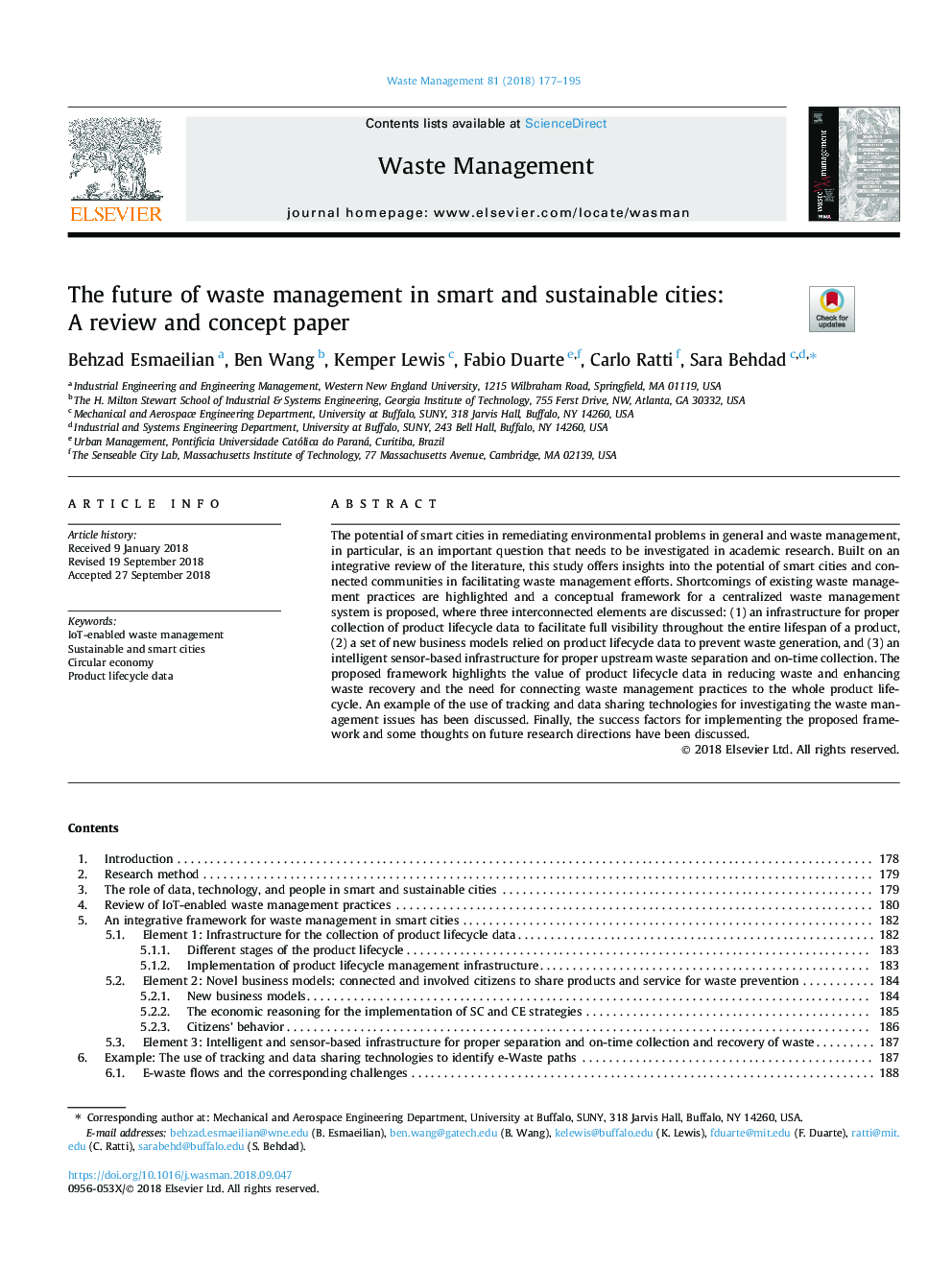| کد مقاله | کد نشریه | سال انتشار | مقاله انگلیسی | نسخه تمام متن |
|---|---|---|---|---|
| 11013060 | 1797395 | 2018 | 19 صفحه PDF | دانلود رایگان |
عنوان انگلیسی مقاله ISI
The future of waste management in smart and sustainable cities: A review and concept paper
ترجمه فارسی عنوان
آینده مدیریت زباله در شهرهای هوشمند و پایدار: یک بررسی و مقاله مفهومی
دانلود مقاله + سفارش ترجمه
دانلود مقاله ISI انگلیسی
رایگان برای ایرانیان
کلمات کلیدی
ترجمه چکیده
به طور خاص، پتانسیل شهرهای هوشمند در احیای مشکلات زیست محیطی به طور کلی و مدیریت زباله، به ویژه، یک سوال مهم است که باید در تحقیقات علمی مورد بررسی قرار گیرد. این مطالعه بر اساس یک بررسی جامع از ادبیات انجام شده است، این مطالعه بینش های بالقوه شهرهای هوشمند و جوامع مرتبط را در تسهیل تلاش های مدیریت زباله ارائه می دهد. نقص در شیوه های مدیریت زباله های موجود برجسته شده و چارچوب مفهومی برای سیستم مدیریت زباله متمرکز پیشنهاد شده است که در آن سه عنصر مرتبط با یکدیگر مورد بحث قرار می گیرند: (1) زیرساخت برای جمع آوری مناسب داده های طول عمر محصول برای تسهیل مشاهده کامل در طول عمر یک محصول، (2) مجموعه ای از مدل های جدید کسب و کار بر اساس داده های طول عمر محصول برای جلوگیری از تولید زباله، و (3) زیرساخت های مبتنی بر حسگر هوشمند برای جداسازی مناسب و جداگانه زباله بالا در جریان از زمان. چارچوب پیشنهادی ارزش داده های چرخه عمر محصول را در کاهش ضایعات و بهبود بازیافت ضایعات و نیاز به اتصال شیوه های مدیریت ضایعات به کل چرخه عمر محصول نشان می دهد. یک مثال از استفاده از تکنیک های ردیابی و به اشتراک گذاری داده ها برای بررسی مسائل مربوط به مدیریت زباله بحث شده است. در نهایت، عوامل موفقیت برای پیاده سازی چارچوب پیشنهاد شده و برخی اندیشه ها در مورد مسیرهای تحقیق آینده مورد بحث قرار گرفته است.
موضوعات مرتبط
مهندسی و علوم پایه
علوم زمین و سیارات
مهندسی ژئوتکنیک و زمین شناسی مهندسی
چکیده انگلیسی
The potential of smart cities in remediating environmental problems in general and waste management, in particular, is an important question that needs to be investigated in academic research. Built on an integrative review of the literature, this study offers insights into the potential of smart cities and connected communities in facilitating waste management efforts. Shortcomings of existing waste management practices are highlighted and a conceptual framework for a centralized waste management system is proposed, where three interconnected elements are discussed: (1) an infrastructure for proper collection of product lifecycle data to facilitate full visibility throughout the entire lifespan of a product, (2) a set of new business models relied on product lifecycle data to prevent waste generation, and (3) an intelligent sensor-based infrastructure for proper upstream waste separation and on-time collection. The proposed framework highlights the value of product lifecycle data in reducing waste and enhancing waste recovery and the need for connecting waste management practices to the whole product life-cycle. An example of the use of tracking and data sharing technologies for investigating the waste management issues has been discussed. Finally, the success factors for implementing the proposed framework and some thoughts on future research directions have been discussed.
ناشر
Database: Elsevier - ScienceDirect (ساینس دایرکت)
Journal: Waste Management - Volume 81, November 2018, Pages 177-195
Journal: Waste Management - Volume 81, November 2018, Pages 177-195
نویسندگان
Behzad Esmaeilian, Ben Wang, Kemper Lewis, Fabio Duarte, Carlo Ratti, Sara Behdad,
